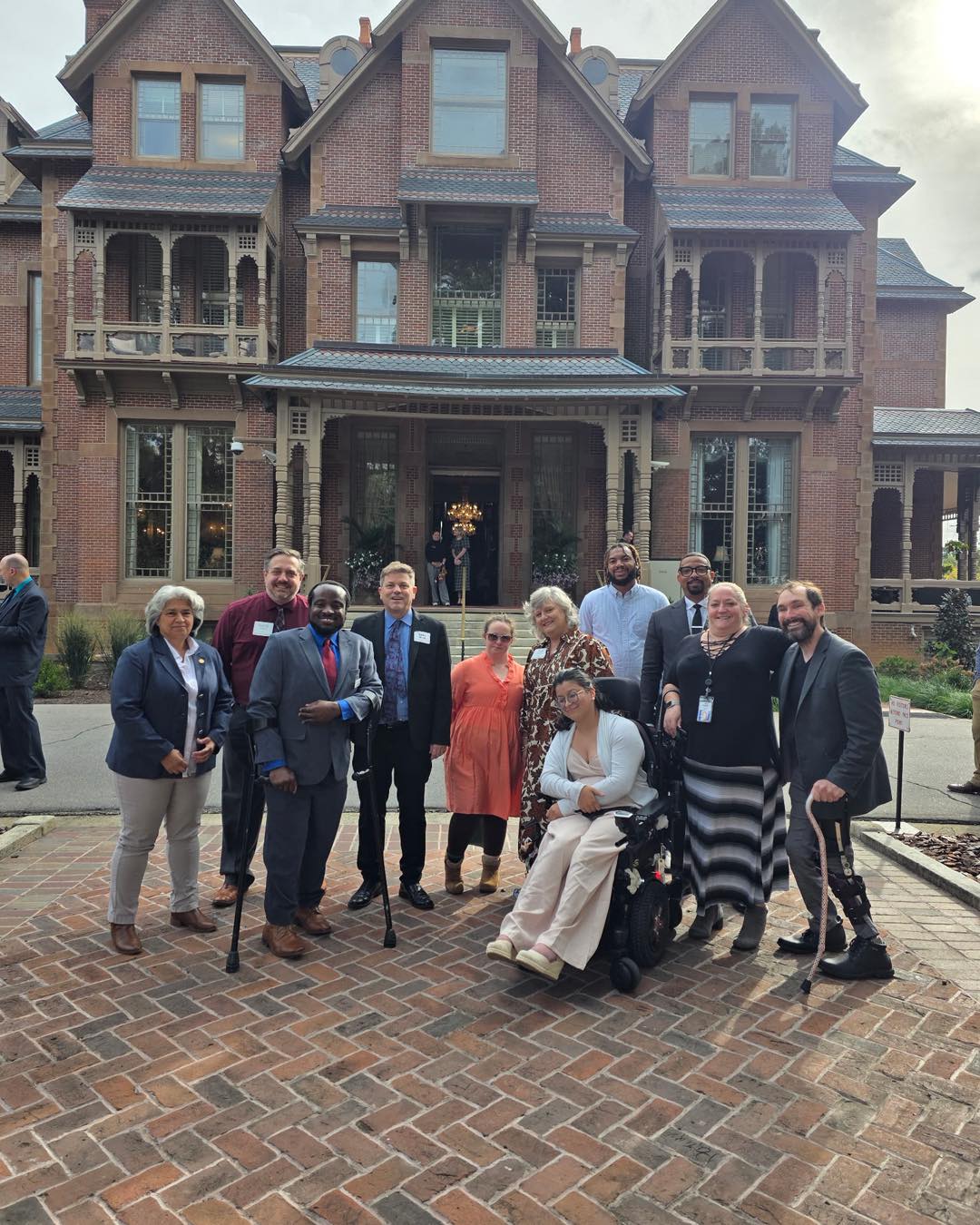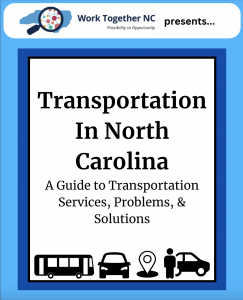October 2025 Highlights and Hot Topics

The October 2025 issue of Highlights & Hot Topics includes a message from our executive director, a celebration of National Disability Employment Awareness Month, a public policy update, transportation resources for people with disabilities, and upcoming webinars hosted by NCCDD. Articles are also available in Spanish and audio.
- Letter from the Executive Director
- NCCDD Joins Governor Stein to Honor National Disability Employment Awareness Month
- Public Policy Update as of 10/23/25
- Work Together NC Releases Transportation Guide for People with Disabilities
- Upcoming NCCDD Webinars in November
- Boletín en español
- Newsletter in Accessible Audio
Letter from the Executive Director
October has been a difficult month with small glimmers of hope.
October was challenging because the intellectual and developmental disability (I/DD) community across North Carolina is experiencing 3% to 10% cuts in their Medicaid. Some of the cuts will not go into effect until November 1, 2025, but even then, I/DD providers may lose some of the money they bill for October based on a process called “recoupment.”
I hope that by the time you read this article, the Medicaid cuts have been stopped. If that happens, then it will be because the I/DD community and many others helped our state leaders understand the impact of the Medicaid cuts.
If, on the other hand, the Medicaid cuts are still in effect when you are reading this, then many people are going to be harmed and some providers will go out of business. The North Carolina Council on Developmental Disabilities conducted a survey starting October 1, 2025 in which 335 people responded as of mid-October. Those responses showed that people from the mountains to the Coast were being impacted and were deeply concerned about the impact of the cuts.
Our community has been through COVID, Hurricane Helene, and a 19,000 person waiting list. The last thing we need is cuts to I/DD Medicaid services.
If the cuts are still in effect and you haven’t yet filled out the survey, you can do so here. NCCDD will continue to share the survey results with state leaders and legislators as long as the Medicaid cuts are in effect.
While all of this is horrible, there were a few glimmers of hope. One of those hopes came on October 10th when individuals with disabilities from across the state went to the Governor’s Mansion to celebrate National Disability Employment Awareness Month with the Governor and people from both political parties.
Another glimmer of hope came when many of us gathered at Appalachian State University for an important conference called Growing Well. The conference was focused on growing up with a disability and on living a full and meaningful life. The conference featured powerful speakers from throughout North Carolina and the Southeast.
While we are in a difficult time, it is also good to continue to find those glimmers of hope. And each of you gives me a lot of hope!
Talley Wells, NCCDD Executive Director
NCCDD Joins Governor Stein to Honor National Disability Employment Awareness Month
 On October 10th, Governor Josh Stein, the North Carolina Department of Health and Human Services (NC DHHS), the North Carolina Council on Developmental Disabilities (NCCDD), and members of the community celebrated October as National Disability Employment Awareness Month (NDEAM) at a reception at the Executive Mansion in Raleigh.
On October 10th, Governor Josh Stein, the North Carolina Department of Health and Human Services (NC DHHS), the North Carolina Council on Developmental Disabilities (NCCDD), and members of the community celebrated October as National Disability Employment Awareness Month (NDEAM) at a reception at the Executive Mansion in Raleigh.
"Today, I was proud to sign a proclamation – in English and in Braille – proclaiming National Disability Employment Awareness Month," said Governor Stein. "This proclamation highlights the contributions people with disabilities are making in workplaces all across North Carolina, including in state government. I am committed to fighting for the success of all North Carolinians."
The event highlighted the personal stories of workers with disabilities and employers who are building a strong and disability-inclusive workforce in North Carolina.
"The North Carolina Council on Developmental Disabilities recently held listening sessions for the disability community across the state from Lumberton and Wilmington to Boone and Asheville. Everywhere we went, we met people with disabilities who love their jobs and others with disabilities eager to work. Employers regularly tell us people with disabilities make the best employees," said Talley Wells, NCCDD Executive Director. "All of us know how important work with decent wages is to our independence and security. We are thrilled to be with the Governor, legislators from both sides of the aisle, and people with disabilities from across the state today to celebrate disability employment!"
Thank you, Governor Stein, for celebrating NDEAM and recognizing the contributions of people with disabilities within North Carolina’s workforce.
For more information, read the NC DHHS press release: North Carolina Celebrates the 80th Anniversary of National Disability Employment Awareness Month
Public Policy Update (as of 10/23/25)
Federal
Budget
The federal shutdown continues to become one of the longest in US history. After no agreement on a federal budget for the fiscal year beginning in October, Congress also failed to come to an agreement on a Continuing Resolution to keep the government operating. Essential services continue, but many federal workers are off the job.
Medicaid funding for Home and Community Based Services, Social Security and Supplemental Security Income (SSI) benefits, and the Individuals with Disabilities Education Act (IDEA) funding should continue to be sent to states. But many other federal functions will be put on hold. With limited staff, the Office for Civil Rights will halt investigations and Centers for Medicare and Medicaid Services is unlikely to be able to approve state plan amendments or waivers.
With the ongoing risk of federal workers being fired, there is a lack of staff to administer annual funding for programs for people with I/DD, like Councils on Developmental Disabilities, creating concern and uncertainty. In the case of federally-mandated protection and advocacy agencies (P&As) like DRNC, funds are routinely carried over from one fiscal year to the next to account for a possible delay in funding, but at some point, carryover funds will run out, and without new funding, P&As would have to stop taking clients and providing needed advocacy.
Education Department
Early in the shutdown, the Education Department let approximately 466 employees go, following through on President Donald Trump’s pledge to lay off federal workers. The Office of Special Education Programs (OSEP), which administers the IDEA, was one of the hardest hit. Their office went from 90 staff to just a handful, making it impossible to fulfill its responsibilities under IDEA. The Rehabilitation Services Administration, which is responsible for vocational rehabilitation, was also hard hit and there were more cutbacks at the Office for Civil Rights.
A federal judge has temporarily blocked these reductions after unions represented workers sued, but there will likely be an appeal of this ruling. Advocates for people with disabilities continue to be concerned about the threats and risks to programs that support and protect needed services.
Rights of Airline Passengers with Disabilities
In the past, we celebrated the new rule that was set to take effect in January 2026, requiring training for airline staff who handle wheelchairs and how to help people with disabilities. The rule also describes steps airlines must take if wheelchairs are damaged or lost. However, the U.S. Department of Transportation now says it will not enforce four key parts of what’s known as the “Wheelchair Rule”. The four parts they are reviewing include the airline’s responsibility for damaged wheelchairs, how often staff must be trained, notification of rights to file complaints, and reimbursements for higher fares when more expensive flights are required to fit the mobility device. The agency said that it expects to propose a new version of the rule in August 2026 and plans to determine whether to issue a final rule no sooner than December 31, 2026.
Definition of Intellectual Disability
The U.S. Supreme Court prepares to take on a case that involves whether a diagnosis of intellectual disability should be based on more than an IQ score. While the case is related to the death penalty, the implications of a decision could have a broader impact. There is an established clinical framework for determining intellectual disability that includes both limitations in intellectual functioning (IQ) and level of adaptive functioning. How intellectual disability is defined can impact access to educational services, home and community-based services, and other community supports. The Arc, the American Association on Intellectual and Developmental Disabilities, the Bazelon Center for Mental Health Law and the National Disability Rights Network filed a brief asking the Supreme Court to rely on the established clinical framework. The American Psychological Association and the American Psychiatric Association filed similar briefs.
State
Medicaid Update
The House and Senate were in Raleigh for a scheduled October mini-session. More than 200 people with disabilities, advocates, and representatives of provider agencies showed up at the legislature on October 21, 2025 to speak about the impact of the recent Medicaid reimbursement cuts. The rate reductions range from 3% to 8%, with some services receiving a 10% reduction. NC Council on Developmental Disabilities Chair Jon D’Angelo spoke about the impact on people with disabilities and the DSPs who support them. He was one of several people who spoke about the services that people will lose if these cuts remain in place.
Near the end of the day, after hearing from so many constituents, the House, led by Representative Donny Lambeth, proposed a bill that would allocate money from the Medicaid Contingency Fund to the Department of Health and Human Services to address the Medicaid deficit. The bill passed out of committee and was approved by the House the following day. However, the Senate had left Raleigh and did not receive the bill. This bill will remain in limbo until the House and Senate reconvene. The next scheduled session for the legislature is at the end of November. Continued education and advocacy is needed.
Work Together NC Releases Transportation Guide for People with Disabilities
Work Together NC’s Transportation Alliance Work Group has developed a guide on the state of transportation in North Carolina and how individuals with disabilities can get started on their transportation journey. The guide is called Transportation in North Carolina: A Guide to Transportation Services, Problems, & Solutions.
The guide provides examples of transportation services for people with disabilities available across North Carolina, from Buncombe County in the mountains to Brunswick and New Hanover counties along the coast. It also has a list of questions that people with disabilities should ask, along with the answers and talking points to use when meeting with government officials about transportation in North Carolina. There is also a glossary of transportation terms with definitions.
Download the in PDF and Word format here: Transportation In North Carolina: A Guide to Transportation Services, Problems, & Solutions
Upcoming NCCDD Webinars in November
The North Carolina Council on Developmental Disabilities (NCCDD) offers several monthly webinars to help you stay educated and informed. All meetings are free and open to the public. Stay informed and become involved in important conversations – there’s something for everyone in the I/DD community!
Policy Education Meeting
Thursday, November 13, 2025, from 10:30 AM to Noon
Learn about important updates about state and federal policies, budget developments, and other issues that affect people with intellectual and developmental disabilities (I/DD). There will also be time for questions and open discussion. Please note that NCCDD only provides public policy education. The Council does not lobby on specific legislation.
Register here: https://www.zoomgov.com/meeting/register/vJItdu-uqD8oHpxzFX9FiES_lSmk_8OP4r4#/registration
Self-Advocate Discussion Series: Cheer, Humor, and Fun
Wednesday, November 19, 2025, from 1 - 2 PM
Get ready for the holiday season with music, comedy, works of art, jokes, storytelling, and more. This month, we will spend our time exchanging joy and laughter. Join us for an afternoon of lighthearted merriment! Come ready to share what brings you joy, what you do for fun, and how you engage in play.
Register here: https://www.zoomgov.com/meeting/register/vJIscuqsqTIuHKmNsMe66wT4whwK0hPGVAM#/registration
Boletín en español
Lea el boletín aquí: Aspectos destacados & temas de octubre de 2025
Newsletter in Accessible Audio
Listen to the audio version here or click on the image below: https://www.buzzsprout.com/2526321/episodes/18081664